The European chemical industry directly employs some 2 million people and is the 2nd largest industry in Europe after the automotive sector. It is composed of large multinational companies and small and medium size enterprises; indeed, over 90% of the chemical companies have less than 250 employees. While it long ranked first by size amongst chemical industries in the world, it lost its leadership to China in 2012. Although employment has decreased by 2.2% on average between 2000 and 2010, with a dramatic drop of 4.6% in 2009 as a result of the crisis, a solid recovery occurred in 2010 (employment in the US decreases on average by 3.3%). However, China and the rest of Asia-Pacific attract massive investment.
Against this background, European sectoral social dialogue was initiated in 2002 with the creation of the European Chemical Employers Group.
Both organisations aimed then to take advantage of the possibilities offered by the Treaties and use this formalised dialogue in the interest of both the chemical industry and its workforce to foster development initiatives for the European chemical sector. The first steps were meant to get to know the persons, organisations and mentalities and very soon cooperation developed further, which led for example in matters relating to occupational health and safety and environment to the signature between the social partners and CEFIC of a “Memorandum of understanding on Responsible Care” on 19 February 2003 and 10 years later a “Joint statement on the New European Chemicals Policy (REACH)” on 27 September 2013.
A first “Joint Position Paper on Education, Vocational Training and Lifelong Learning” was signed by the social partners in Helsinki on 10 September 2004, which paved the way to more joint work, increasingly more focused, in this area.
Following a decision by ECEG and industriAll Europe (then EMCEF - the European, Mine, Chemical and Energy Workers Federation) at their social partners conference in Helsinki on 10 September 2004, the Sectoral Social Dialogue Committee (SSDC) for the European Chemical Industry was officially inaugurated by Mrs Odile Quentin, Director General of DG Employment, Social Affairs and Equal Opportunities, in Brussels on 14 December 2004.
This was a good start and during its ten years of existence the Sectoral Social Dialogue Committee of the European Chemical Industry has agreed on over 15 joint texts, in the form of declarations, position, agreements, etc. (see annex 1).
EMCEF ECEG CEFIC REACH
These joint texts aimed at contributing to the development of European industrial, energy, environmental and social policies. At all times it was important for the social partners to strengthen the sustainability of the European chemical industry and its workforce in all those areas.
Among others, ECEG and industriAll Europe refer to their "Joint Lessons Learned on Restructuring, Managing Change, Competitiveness and Employment” agreed upon on 15 May 2008, their “Joint Declaration on the global economic crisis” of 13 May 2009, the “Joint Declaration on Framework Conditions for a Sustainable Chemical Industry in Europe” of 6 September 2011 (signed with CEFIC) and their joint texts on the proposal for a directive on energy efficiency of 20 March 2012 and on the Green Paper “A 2030 framework for climate and energy policies” of 6 December 2012, as well as to their “Framework Agreement on Competence Profiles” of 15 April 2011. All those texts are still valid and provide useful input for the social partners on European and national level as well as national governments, the European Commission, the European and national parliaments and other actors both on national and European level.
sustainability Competence Profiles climate and energy policies
Joint declarations on vocational training and lifelong learning as well as agreements on minimum core competences for typical chemical industry jobs ensure high standards in the European chemical industry.
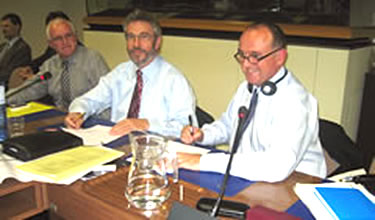
Social partners thereby contributed to the developments of safer, well paid and good quality jobs in Europe and to keeping the European chemical industry competitive worldwide. They also work together at attracting young talents in the sector thereby reducing youth unemployment.
Working on common education and vocational training frameworks enables people to be more mobile within Europe, to bring labour markets closer together, to strengthen the employability and to reduce regional mismatches within the EU. This is one of the reasons why our “Framework Agreement on Competence Profiles” was developed.
To concretise this joint work further, the social partners had carried out a feasibility study based on which they later decided to set up a European Sector Skills Council through the appropriate budget line. Because of a change of criteria in the budget line however, making it more difficult to apply, and a later change in strategy by the European Commission (transfer from DG Employment to DG Education and Culture), ECEG and industriAll Europe have to wait and see if the new strategy - still to be developed - makes sense and brings added value for both social partners.
vocational training labour markets lifelong learning
Social Partners in the European chemical industry agree that sustainable, safe and adequate pensions are an important building block of the European social model. The risk for elderly Europeans to fall into poverty needs to be further reduced. National governments together with social partners and other relevant actors have to take the necessary steps for this purpose and an intensified coordination on EU level should be helpful for this.
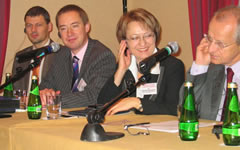
In a number of EU countries occupational pensions have a long and successful tradition. Social partners have introduced during the past years additional measures and funds for employees in the sector contributing to sustainable, safe and adequate pensions and thereby reducing the risk of old age poverty.
Proposals to revise the so-called IORP directive with the aim to introduce quantitative solvency requirements for pension funds orientated or based on to the so-called solvency II regulation for insurance companies would have endangered these achievements. Therefore the social partners in the chemical industry strongly rejected such ideas for additional EU-level regulation of national occupational pension systems in their joint declaration on the “Green Paper towards adequate, sustainable and safe European pension systems" of 31 January 2011.
This initiative was followed by a further joint text: „Revision of IORP Directive must not lead to higher costs and shrinking occupational pensions“, signed with CEEMET (the European employers’ organisation for the metal sector) on 27 September 2012.
Pensions IORP Directive Green Paper

Thanks to the contributions from industry and social partners during its development the existing REACH regulation has played an important part in building stakeholder confidence in our sector. Companies, their associations and employee representatives contribute actively to complying with those regulations and to make the European Chemicals Agency ECHA a successful institution. However, it remains necessary to regularly revisit details of the regulation and especially to ensure it does not place too heavy and unrealistic burdens on SMEs in the sector, which would drive those companies out of business and destroy jobs. The difficult balance between occupational health and safety, environmental safety, social security and competitiveness of the industry needs to be monitored constantly and necessary adjustments have to be made. The social partners are aware that conflicts of objectives do arise in this area and have contributed and will continue to contribute to taking the best decisions for the industry and its employees as well as the environment and society as a whole.
Our latest contribution in this respect, the “Joint Declaration on REACH and the inclusion of nanomaterials in its annexes” signed on 9 September 2014, carefully balances the need for adequate collective and individual workers protection with the need for industrial innovation. It also highlights the fact that the fee regulation adopted in 2003 allowing SMEs to benefit from reduced registration fees of up to 95% is already an important step forward and that clarity and stability for the regulatory framework are necessary. We will aim at conducting an evaluation and/or impact assessment to see how the declaration has helped to deal with this issue on the national level.
REACH nanomaterials impact assessment ECHA
The European pharmaceutical industry is of global importance for the development of new medicines and the fight against diseases. Due to the increased need for cost efficient procedures in national health systems and the pressure on public expenditure the European market for pharmaceutical products is less dynamic than in the past. At the same time further research and innovation and the development of new pharmaceutical substances and products are necessary.
This was a major focus of the Social Partners Conference of 10 April 2013, organised with the help of the European Commission at Eurofound in Dublin, where the decision was made to formally include NACE 21 (Manufacture of pharmaceutical products and pharmaceutical preparation) in the SSDC for the chemical industry.
We underline the indispensable contributions to public health and its added value of the pharmaceutical industry. Therefore it is necessary to fix the right framework conditions and to set the best incentives both on EU and on national level in order to keep a competitive and job rich pharmaceutical industry in Europe. The social partners of the sector are prepared to contribute actively to such a development.
The commitment of the social partners towards this sector was reinforced further by our joint letter of 31 March 2015 on the scope of the SSDC to European Commission Vice-President Valdis Dombrovskis and Commissioner Marianne Thyssen, in which we stress that the representativeness study carried out by Eurofound in 2014 shows that in addition to NACE 20 (Manufacture of chemicals and chemical products) and NACE 22 (Manufacture of rubber and plastic products), members of ECEG and industriAll Europe also cover NACE 21. The letter of the social partners was positively acknowledged by the Commission on 7 May 2015.
pharmaceutical research innovation development
Our industry covers the most energy intensive production processes. Therefore it is of utmost importance for companies and employees in the sector to ensure a reliable energy supply at globally competitive prices all over the EU. The same also applies to a fair access to natural resources.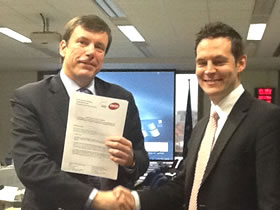 If those conditions are not met, competitors from other parts of the world would be given an unfair advantage, which could no longer be balanced by European companies and employees.
If those conditions are not met, competitors from other parts of the world would be given an unfair advantage, which could no longer be balanced by European companies and employees.
Despite possible conflicts of objectives it is necessary to create, define and implement an innovative European energy policy which prevents European jobs to be exported by balancing economic, social and environmental aims as far as somehow possible. Otherwise it will not be possible to reach any global environmental or social goals due to a shift of production to regions of the world with relatively lower average standards.
The social partners have already contributed extensively to this debate with their “Joint Statement on the European Union Emission Trading Scheme (EU ETS)” on 29 September 2008 and their aforementioned joint text of 6 December 2012 on the Green Paper “A 2030 framework for climate and energy policies”. A further contribution will be made on the Energy Union in October 2015 ahead of the United Nations Climate Change Conference (COP 21) in Paris.
competitive energy natural resources ETS
The European Commission has a duty to support social dialogue, but in the current general political climate, „A New Start for Social Dialogue“ announced by European Commission President Jean-Claude Juncker, at a high-level conference on 5 March 2015, sounds like a grand title and a clumsy attempt at hiding the reset button. European and national cross-sectoral social dialogues are indeed important and must be fostered, but not at the cost of European and national sectoral social dialogues. The Commission has a duty to support both sides of the social dialogue spectrum, and ECEG and industriAll Europe regret the ever decreasing attention and human resources being devoted to sectoral social dialogues.
Whilst we recognize that it is the social partners responsibility to ensure that social dialogue works, we are doing our bit in the European chemical sector, and we certainly expect that the European Commission does its bit too and insist that our rights to support, autonomy and consultation (Art 154 & Art 155) be respected at all times.
support autonomy consultation
A significant part of our joint work is devoted to joint lobbying of the European institutions and national authorities, but this in itself is already an important challenge that we have managed to consistently meet for the past 10 years. Much of this work is meant to ensure the sustainability of the European chemical industry, competitiveness and job growth.
An important part of our joint work is also meant at spreading best practices amongst our affiliated organisations in order to strengthen industrial relations and capacity building at national level. We can probably do better as participation from new countries at our meetings has somewhat decreased lately.
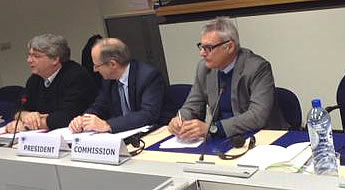
Whilst the European Commission categorizes our joint text according to its own classification, some of our outcomes go further than this typology. Our Joint opinion on the global economic crisis, for example – inevitably classified as joint opinion – went much further than that. It provided a framework by which in order to keep skilled workers employed – national social partners could agree when measures to reduce working time had to be introduced to use the available time to improve the skills of the workers by training and education. This measure was of course only possible short-term, but an evaluation after one year showed that it had helped reducing the impact of the crisis on the sector in various countries/companies (Belgium, Denmark, France, Germany, Italy, etc.) and some decided to prolong it for another 6 months.
Our Joint Lessons learned on Restructuring, Managing Change, Competitiveness and Employment – classified as a tool – were meant as a set of best practices to be copied/adapted. No evaluation was carried out at the time, but the social partners learned from this experience and decided to make ”Innovation, R&D, anticipating and managing change” a priority of their Roadmap 2015-2020, with concrete objectives/targets, evaluation and follow-up measures.
The Framework agreement for Competence Profiles – classified as framework of actions – was evaluated in 2012 and 2015. Results show that in those countries where social dialogue is well developed, the agreement had been widely disseminated, that it had had no major impact on competence profiles in big companies but that it could, however, still be put to better use in SMEs. Despite some success in Central and Eastern Europe, better dissemination is still needed in some countries and developing a couple more profiles in the agreement might be useful. The follow-up to the agreement is therefore also a priority of the Social Partners Roadmap 2015-2020.
The Memorandum of understanding on Responsible Care – classified as a declaration – showed over the years that the lack of involvement of industriAll Europe in this voluntary initiative was not satisfactory. It was therefore decided together with CEFIC to enlarge the scope of the memorandum into a wider platform for cooperation which will be monitored regularly and reviewed if necessary.
The Social Partners have joined the European Alliance for Apprenticeship on 26 April 2015. This will be one way to contribute in a concrete manner to reducing youth unemployment in our sectors.
change competitiveness employment
ECEG and industriAll Europe did learn from their joint work for the past 10 years. 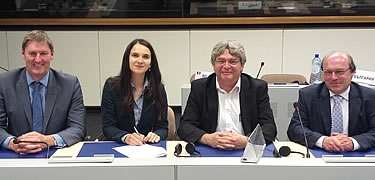 We did build trust and understanding on European level but have to disseminate this better on national level. We know that ever more concrete outcomes are expected from the sectoral social partners and we have considered how best to achieve this.
We did build trust and understanding on European level but have to disseminate this better on national level. We know that ever more concrete outcomes are expected from the sectoral social partners and we have considered how best to achieve this.
This joint reflexion led us to apply for project funding with the European Commission in order to help with the implementation of parts of the work programme of the SSDC. The Commission approved project VS/2015/0033 „European Chemical Social Partners Roadmap 2015-2020“ on 3 March 2015 which allows us to develop a joint framework of actions.
roadmap 2015-2020 framework action
List extracted from DG Employment, social dialogue texts database link
EC DG Employment Joint Statements